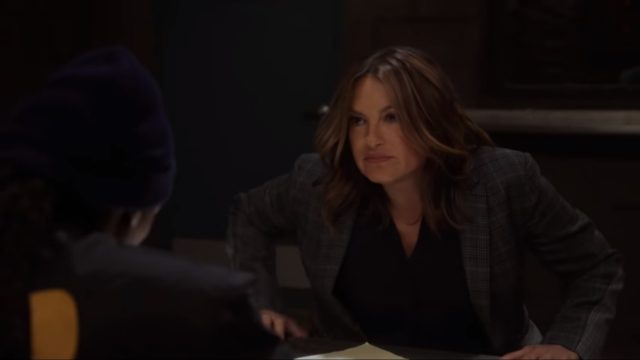I wouldn’t say I like Law & Order: SVU, but I definitely have a perverse fascination with it. In terms of pure entertainment and in the context of American cop procedurals, I’d put it above the NCIS franchise and below Criminal Minds, but it has a peculiar, particular vision that those other shows lack, and I think that vision has, for multiple reasons, been what’s kept it churning out stories for two decades. ‘Vision’ is a term that’s usually applied to film and usually applied to a single creator that flows down to the others; obviously, much of the L&O franchise can be put on the shoulders of producer Dick Wolf, but it feels like his ‘vision’ in the show is closer to a set of rules that he laid down that the people below him – writers, directors, actors – follow to keep generating more episodes. It’s not the vision of a director in that there’s a specific image in one person’s head that the rest of the crew are working to create, it’s the mission statement of a business. My fascination with Law & Order: SVU is part of my broader fascination with ‘factory-made’ art – companies like Motown, Hammer Horror, Marvel, DC, and shows like soap operas or Saturday Night Live that are less about individual expression and more achieving mass entertainment by, ironically, holding oneself to a company-mandated set of rules. These organisations are often known for producing some of the top entertainers in their fields – Marvin Gaye, Smokey Robinson, Christopher Lee, Peter Cushing, Gail Simone, Frank Miller, Grant Morrison, Brad Pitt, Julianne Moore, Demi Moore, Will Ferrel, and Julia Louis-Dreyfus are all mega-stars who profited commercially and creatively from their times in these trenches. From this perspective, the Law & Order franchise has had more modest success, being less about producing big stars directly and more about giving workaday actors a day job – literally every actor working in LA has appeared on the show at some point and gotten a little more for their reel. And I don’t know of any famous writers, directors, or producers who got their start on it.
At the same time, it has been wildly successful at building an audience, and I think that’s because it’s gotten its rules down to a fine art. Procedurals are notorious for being ‘formulaic’, but this is wildly overstated; in this case, it’s not that things are laid out to happen in an exact order, it’s that the show delivers predictable reactions to specific actions. The show has a consistent morality – mainly, an anger at rape, but also a general conservative outlook, being more and more repulsed by people the further away they get from being Good Cops With A Normal, Upper-Middle-Class Family. On top of this, there’s a carefully considered approach to story, where everything has a single purpose and carries us on a journey from the start of the episode to its end. Every scene of every episode shows either someone making a choice, or reveals a new piece of information that recontextualises the situation (for example, revealing that the straight A student whose mother has been sleeping with teenage boys is herself an alcoholic); it injects a powerful energy into a show that’s otherwise tonally and morally static. This is followed up in the characterisation, where everyone is either a Detective, Victim, Witness, Suspect, Judge, or Exposition Dump and is treated the way that category deserves; if, like a Twin Peaks character, someone switches roles, the detectives switch technique without missing a beat. Working in tandem with the pacing is the everloving flow of ideas. L&O is just as fascinated by the thoughts people are capable of as The Petrified Forest, even if it filters them through its moral outlook as opposed to simply studying them for their own sake, and ploughing through them like a carnival freak show is part of the rush of the experience.
Building a loyal audience means finding a balance between surprising them and not surprising them, and whatever I might think of L&O: SVU‘s politics or artistic value, it’s clearly struck that balance, and it’s paid off with long, comfortable careers for quite a few people. One best weathers a chaotic world with the same thing one uses to find a community: a strong sense of self. Oddly enough, I find much of this resonant to writing essays. There’s the short-term sense of constantly seeking out new ideas and experiences to process through a familiar set of essay-writing techniques; watching the characters not just beating around an idea but doing so with a few simple techniques is weirdly resonant with my own writing process. There’s also the long-term sense of finding an audience. In the short-term, it’s tempting to try and repeat what you think an audience wants to hear, but it’s more satisfying to write from the heart and take pleasure in your work just for its own sake, and build an audience over time who is drawn to what you want to do anyway.


